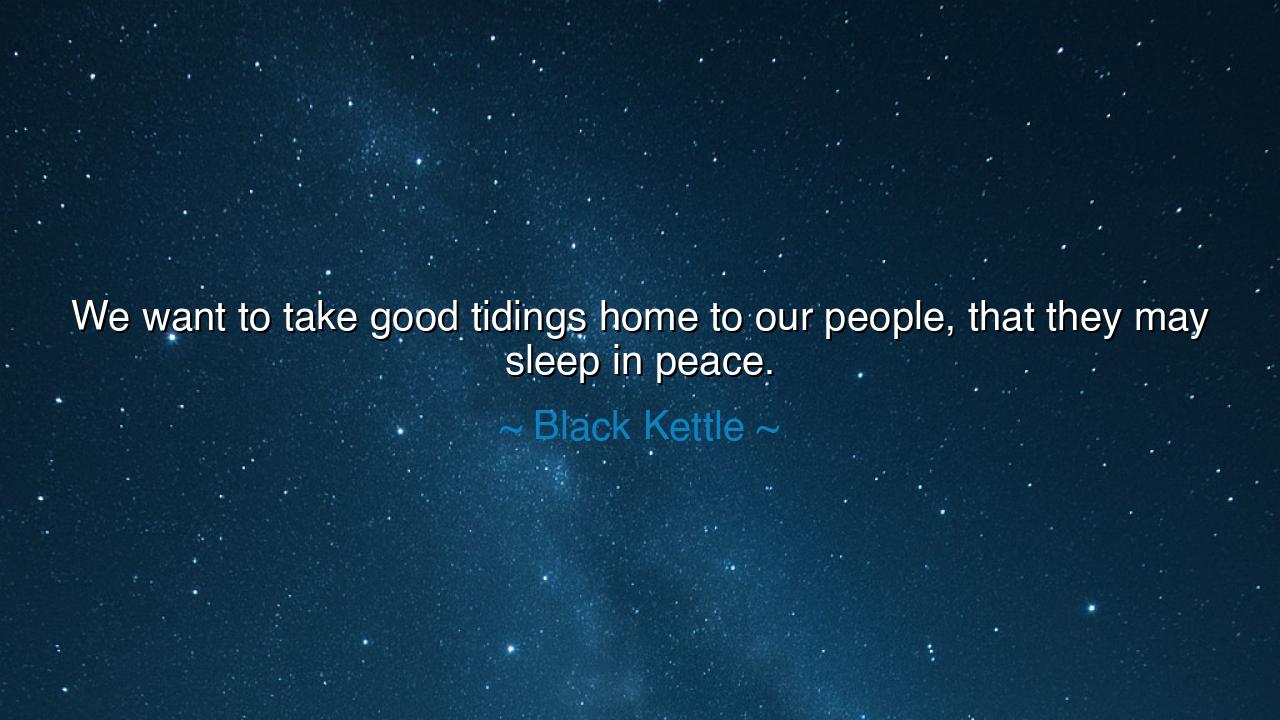
We want to take good tidings home to our people, that they may






"We want to take good tidings home to our people, that they may sleep in peace." Thus spoke Black Kettle, chief of the Southern Cheyenne, a man who bore the burdens of leadership in one of the darkest hours of his nation. His words are simple, yet they burn with the eternal longing of every leader, every parent, every elder: to bring peace to their people, to carry news not of death and fear, but of safety and hope. For what greater treasure can a people possess than the ability to lay down their heads at night without dread, to let their children sleep in peace?
The ancients would have understood this desire. Did not the prophets of Israel speak of the day when swords would be beaten into plowshares, when men would rest beneath their vines and fig trees, unafraid? Did not the Romans, after centuries of bloodshed, exalt their pax, however fragile, because even an imperfect peace allowed fields to be tilled and children to grow? Black Kettle’s words echo across time: though cultures differ, the human heart always longs for the same gift—the quiet security of life unharmed.
Yet Black Kettle spoke these words in the shadow of tragedy. Again and again, he sought treaties with the United States, hoping to preserve the survival of his people through negotiation rather than war. He carried white flags, raised signs of truce, and sought to bring good tidings back to his people. And yet, his camp was attacked at Sand Creek in 1864, where hundreds of his people—many women and children—were massacred. Still, he did not abandon his pursuit of peace, even though betrayal met him at every turn. His plea was not for conquest, but for survival, so that the Cheyenne could live in dignity, free from fear.
History bears many such examples of leaders who carried the burden of their people’s sleep. Consider Abraham Lincoln, who in the darkest days of the Civil War prayed not for triumph alone, but for the healing of a nation so that all its citizens might one day live unafraid. Or think of Nelson Mandela, who after years in prison sought not vengeance but reconciliation, desiring to bring home the news that South Africa’s children could live without chains. Like Black Kettle, they knew that the truest victory was not the defeat of enemies, but the preservation of life.
Children of tomorrow, learn this: the measure of leadership is not how loudly one speaks or how fiercely one fights, but how faithfully one safeguards the peace of their people. The true leader is the shepherd, who seeks good tidings not for himself but for those in his care. It is a heavy burden, for the world often offers war more readily than peace, betrayal more swiftly than trust. Yet to carry the hope of peace back to one’s people is the noblest of labors.
Practical wisdom lies close at hand. In your own life, strive to be a bringer of good tidings. In your family, your friendships, your community—work not to stir fear or division, but to calm and reassure. Let your words and deeds allow others to rest easier, to feel safer because of your presence. Seek reconciliation when anger arises, and guard the peace of others as you would guard your own. Even in small acts, you may allow someone to sleep in peace, and in that, you carry out the wisdom of Black Kettle.
Thus the lesson is clear: peace is the highest gift, and to bring it home to others is the highest duty. Black Kettle’s words, born of struggle and sorrow, still call to us today: be bearers of good tidings, protectors of safety, messengers of calm. For if a people can sleep without fear, they may rise in strength, build with joy, and walk into the future with hope. Let us, then, be makers of such peace—not for ourselves alone, but for all who dwell under the same sky.






AAdministratorAdministrator
Welcome, honored guests. Please leave a comment, we will respond soon